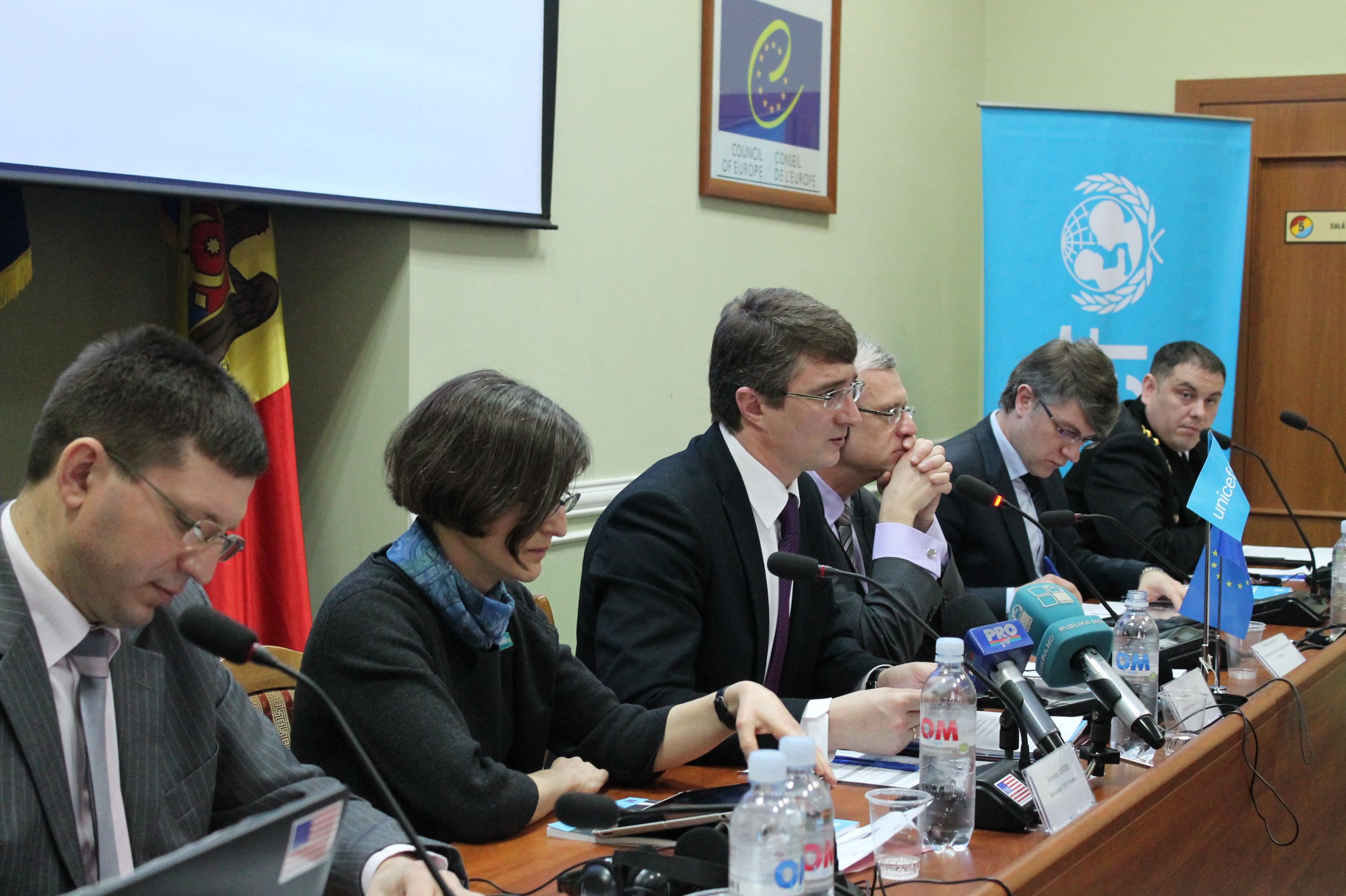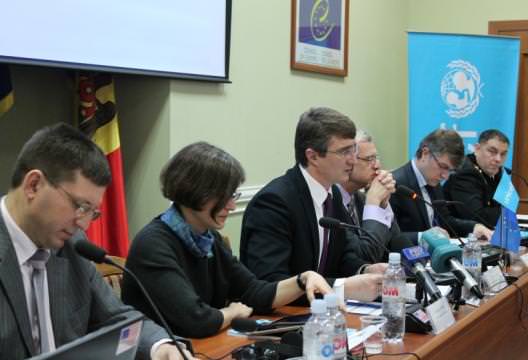Conference on study report "Torture and ill-treatment against children / minors in the context of juvenile justice: the spread, impact, prevention identification of cases, providing support and reporting. "
During the Conferenceon study report "Torture and ill-treatment against children / minors in the context of juvenile justice: the spread, impact, prevention identification of cases, providing support and reporting. “ that was held in conference hall of National Institute of Justice on April 5 2013, the representatives of various international organizations in Moldova, officials of Ministry of Internal Affairs, General Prosecutor’s Office, lawyers, civil society representatives discussed on necessity of torture reduction.
The study was conducted by the Center of Human Rights and Rehabilitation Center for Torture victims “Memoria” with methodological and financial support of UNICEF Moldova, EU-UNICEF joint project "Reaching Critical Mass: Consolidation of juvenile justice reforms against torture and other forms of ill-treatment in former Soviet countries (Reaching critical mass: Strengthening juvenile justice reforms against torture and other forms of ill treatment in former Soviet Union countries), implemented with the support of the European Union.
In its opening speech the Parliamentary Advocate, Director of the Center for Human Dights of Moldova, the Head of National Preventive Mechanism, Anatolie Munteanu noted the necessity of this study pointing the necessity of the study remarking usefulness of made investigations and analyzes, as well as the impact that must have this report on public opinion and especially on opinion of specialists involved in the field of mentioned research.
Torture applied to minors that are in conflict with law, causes of this phenomenon, the physical, psychological and social consequences of torture, opinions of involved institutions in the fight against torture were analyzed in the study report "Torture and ill-treatment against children / minors in the context of juvenile justice: the spread, impact, prevention identification of cases, providing support and reporting."
The results obtained from the interviewing of 42 minors in detention, shows alarming inefficiency of existing anti-torture mechanisms, starting from the time of submission of complaints (in person, by lawyer or relatives) until the judgments of legal instances. The majority (69%) of minors that have been interviewed during the survey claimed that they have been mistreated reporting that they suffered from beatings, prevailing method in statistics of relevant institutions (General Prosecutor Office, Ministry of Internal Affairs), and 31% of respondents have denied or abstained to answer. Regarding the psychological torture, almost ¾ of minors said they have been threatened with prolonged detention with strong beatings and even death. According to the data obtained during the study, most of minors (76%) have not submitted complaint, for various reasons, predominantly by lack of confidence in relevant law authorities and fear of being subjected again to torture or ill-treatment measures. The minors related that they had no real support from prosecutors; being advised to stop further concerned proceedings or even intimidated. They have not been granted with any legal or psychological assistance, minors, under these conditions, often felt defenseless.The majority said they rarely had the necessary support from the lawyers appointed to defend them, which have not explained their rights and procedural guarantees. No one minor has not confirmed that he consulted a doctor, with carrying out a subsequent investigation in order to establish the diagnosis under legal research of torture. Decisions of national legal instances have no effect on prevention of torture phenomenon and ill-treatment against minors: from very small number of criminal cases (2011-5, in 2012-1), which were submitted to the court (the rest being closed), only in two were issued sentences: one that provides penal fine, the second sentence - conviction with conditional suspension of sentence. In other cases which were examined by the court were issued verdicts of acquittal.
The study authors have investigated various aspects and effects of torture and ill-treatment: they have conducted an analysis of the existing legal framework and mechanisms of torture and ill-treatment, efficiency analysis in terms of official statistics on complaints investigative actions and results, the medical and psycho-social life of minors that are in detention, etc, and developed several recommendations:
Modification of the legal framework that regulates disciplinary sanctions applied to convicted persons, in order to exclude incarceration as a disciplinary measure applied to juvenile detainees.
Modification of the legal framework in order to regulate the abilities of minors to exercise their rights to petition and the procedure for their examination.
Olso the authors of the study consider on strengthening the mechanism on the application of the protection measures to regulate the state provision of legal assistance for children-who are victims of crimes, produce a set of universal indicators to collect and process the unconsolidated data on the children in conflict and in contact with the law.
Raising public awareness on torture and ill treatment and its impact on victims and society remain a necessary long term action for public opinion into formation of attitude of prohibition of torture phenomena.
As well as inclusion in the training curriculum and the initial and lifelong training of comprehensive set of materials on torture and ill treatment: prevention, combating, documentation, investigation, detection and assistance of cases
Enother aspect is to ensure the functional independence of medical services within the institutions that provide services for people who are detained, in particular minors, with increasing professionalism of medical and psychosocial staff and their awareness in the field related to the effects of torture and ill treatment on minors.
Develop programs to identify victims of torture and ill treatment early, including juveniles, who are in custody or detention. The program should monitoring juveniles and offer complex assistance, to prevent aggravation or expansion oftheir trauma, and develop programs forrehabilitation.
To make the rehabilitation of torture victims a core priority for the key institutions: Ministry of Justice; Ministry of Health, Ministry of Labor, Social Protection and Family of the Republic of Moldova. Make rehabilitation a priority in dialogues between Moldova-EU and other external partners and include the participation of NGOS..




